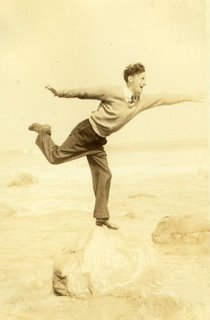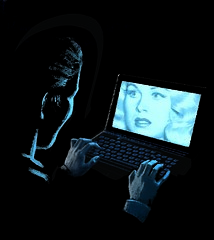Bread Crumbs

The author's father, apparently struck by the muse.
I was watching a movie I wrote, and I heard my father. Not his voice, just one of his favorite phrases. I’d given it to a character and almost twenty years after he died, my dad’s favorite expletive made it to HBO. My father’s word: “bollixed.” As in, “all bollixed up.”
This wasn’t intended as a memorial. It simply showed up in my mind as the right thing for the character. But it started me thinking about all the other peculiar bread crumbs I’ve dropped along the trail as I’ve written. I’ve casually used the names of friends and family, given a special character my birthday and another one eyes just like those of a girl I knew in college. I’ve named apartment complexes after people I know, forced character to watch my favorite Ed Wood movie, and I once included in a script a discussion of “Chicken Oh-My-Gosh,” a dish which has meaning to maybe ten people on the planet. I’m not talking about major events and big themes. I mean that Breughel writing you do to fill up the canvas.
And we all do it. After you learn Rod Serling grew up in Central New York, it dawns on you The Twilight Zone is crowded with characters getting off buses from Binghamton, or rushing home to Syracuse. It’s not restricted to writing either. N.C. Wyeth multiplied his wife Carolyn a dozen times in the book illustrations he did for Scribner’s at the beginning of the previous century, turning her into a battalion of heroines, including Maid Marion.
Over the years I’ve dotted the landscape with thank-you notes and postcards, fossils of my personal archeology. Writing is an aggregate of details, so whose details am I supposed to use? It’s just business. But lately I’ve started to think there might be more to it.
This thinking is a factor of maturity and age. Maturity, because it comes at a point when I’ve done enough work to be able to look back and detect patterns and moods. Age, because I’ve reached that point where things become finite and you start thinking in terms of legacy.
Writing is something we do alone and I believe these personal invocations are a way to warm the empty room a few degrees. We put familiar faces at the edges to make things less intimidating. Neighbors and lovers smile up at us and scenes become snapshots; things are manageable again. “Sure, this scene will work. Look, that’s my dog over there in the corner.”
It reminds me of how builders like to sign secret places behind the plaster and wood of a house. You’re not aware of it, but all around you are signatures and signs, like benign ghosts helping to hold the walls together. One of the great secret pleasures of writing is knowing that the connective tissue of a script is alive with all those people, all that memory. And nobody knows it but us. Just the writers, dropping bread crumbs and carving our initials in the beams.
Which brings us to the question of immortality. A lot of writers duck the issue, but we all know it’s there. It was there when we were too young to be embarrassed by the sheer hubris of hoping, thinking, in some cases assuming what we were doing was forever. Some life, some experience, and we learned this isn’t a topic one discusses in mixed company. But it’s always there.
We have no control over what lasts and what doesn’t. For what it’s worth, history seems to favor “popular” over “official” art. That’s why it’s always the commonplace things, the bowls and household gods, that survive and keep telling their stories. There’s no way of knowing for certain, but that doesn’t stop us from thinking about it. Somewhere in the back of our hearts there’s the hope that what we write will survive. This time we’ll get it right and say something that sinks into the gene pool and outlives us.
Scary business, setting off on that kind of quest. So we look for ways to make the journey less daunting. What say we take along some company? How about everybody we love? They’re nice folks, they’re entitled to a crack at immortality. Let’s bundle them together, their names and words, quirks and passions. We’ll hold them close and start the trip.
When we do this, when we pepper the page with our lives, it connects us to the ones we love. But it also connects us as artists; as people who know details are the things that breathe. Forgotten or remembered, at least we won’t be alone.


0 Comments:
Post a Comment
<< Home